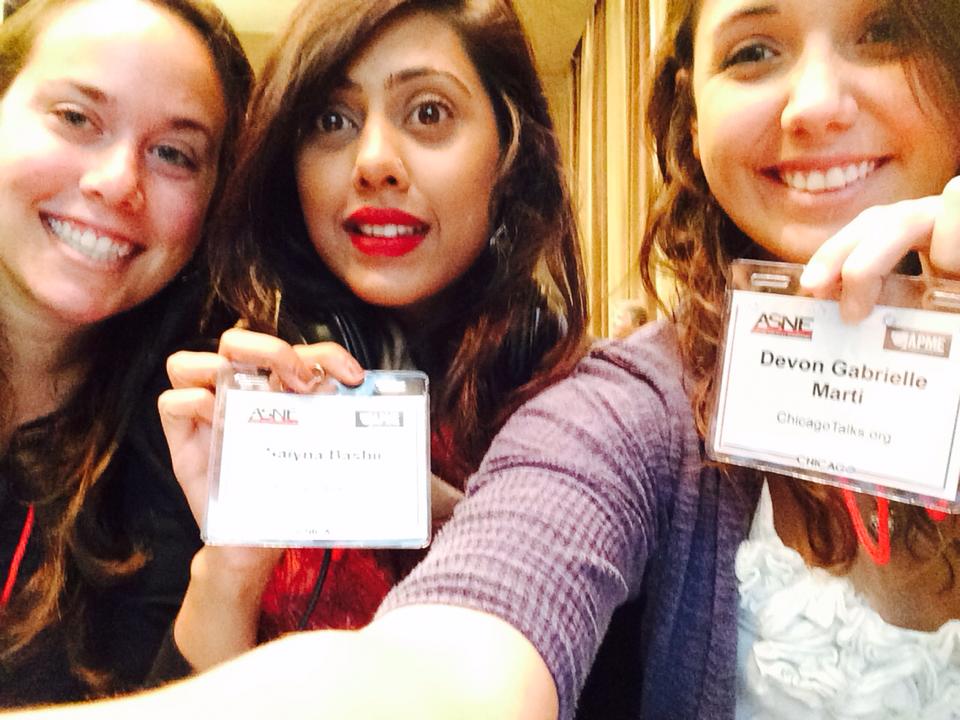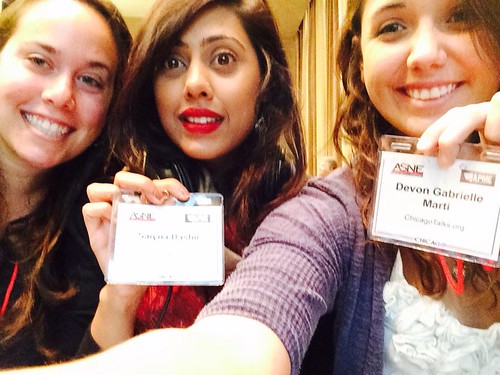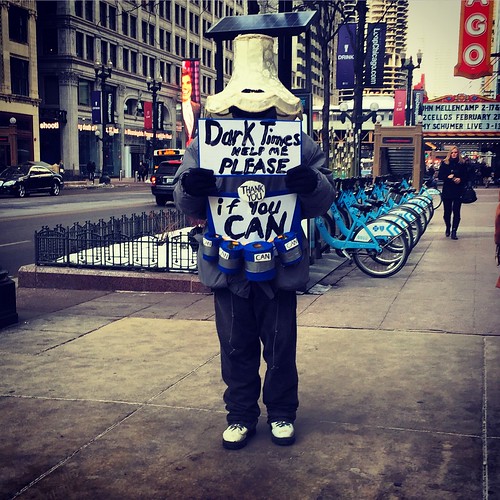
It is Really All About Who You Know

Megan Wenzl, Saiyna Bashir and Devon Marti attend the ASNE conference in August.
When I first started to look into Columbia College Chicago for graduate school, I honestly had no idea what I was getting myself into. I applied to the school as an alternative plan for schools, as my plan since the age of sixteen was to move to Boston and become a journalist there.
I was accepted into both of the programs I applied to, but I chose Columbia College. For some reason, something inside of me was telling me this was the right choice; Chicago was where I was meant to go.
I started Columbia College not being completely familiar with its faculty and staff. I knew the program was based on reporting public affairs, which, as someone who wanted to be a political journalist at the time I arrived, I figured would be perfect for me.
During the month of August, we began our fall bridge program with Suzanne McBride, Dr. Norma Green and Curtis Lawrence, all of us unaware of who exactly was going to be teaching us, and what we were about to get ourselves into. We spent the first week getting to know each other. We learned Curtis used to work for the Chicago Sun-Times as an urban affairs reporter; Norma has 25 years print media experience in newspapers, magazines, and book publishing; and Suzanne worked as an assistant managing editor for The Indianapolis Star, as well as was a congressional aide for former U.S. Rep. Tony P. Hall in Washington, D.C.
While these qualifications impressed me and my classmates, we still didn’t fully understand who was going to be teaching us the industry we all desired to be in. It wasn’t until Norma gave us our first assignment that we were exposed to who our professors really were.
Our first assignment was to find an active reporter to shadow for the day and get advice from. We were told that we might be turned down a few times before we were able to find someone. As someone who was completely new to Chicago, I was absolutely terrified. How was I, an at the time 21-year-old girl from the suburbs of Cleveland, going to call REAL journalists who worked at the Chicago Tribune and the Chicago Sun-Times? They were never going to talk to me, let alone agree to let me shadow them.
To my surprise however, I was able to get a journalist to agree to spend the day with me after only having to call three others. Lauren FitzPatrick, the education reporter at the Chicago Sun-Times, allowed me to shadow her for the day, meeting her in the news room at 10 a.m. and then going out on assignment with her to look into the recently closed 50 public schools in the city. I was ecstatic; I could not contain my excitement when I got to the Sun-Times; I mean, they have a personal Starbucks machine, game room and a full out candy bar…what was there not to be excited about?
Once I was in the newsroom, Lauren introduced me to countless reporters, editors and interns, who all asked me what school I was from and how long I had been in Chicago. As soon as I said I was from Columbia College, their faces would light up and they would ask if I had had the pleasure of working with Curtis, Suzanne, Norma, Len Strazewski, a former technology reporter who contributed to the Sun-Times and the Tribune and Jackie Spinner, a war-correspondent for the Washington Post for 14 years. While I could only answer at the time that I knew of Curtis, Suzanne and Norma, the amount of connections I made that day by just knowing these three professors began to change my career. I came to learn that Curtis was one of the best reporters the Sun-Times had ever had, and that he was an excellent obituary writer—something I had never expected to learn. I also found out that Suzanne’s husband, John O’Neill was the Assistant Metro Editor at the Sun-Times.
While it was nice making connections because of my professors’ connections, that wasn’t the only thing that would come to surprise me about Columbia’s journalism graduate program. As time went on in the fall semester, I came to realize all of the wisdom each of our professors had and were willing to share with us was going to be the key to succeeding in this career—that, and a lot of hard work.

A man asks for help on State Street in Chicago
The professors at Columbia College will go above and beyond to help you in your career, along with helping you find the sources you need for stories and the connections you need to get those sources, but not without you contributing as well. Being a journalist in Chicago is hard work, long hours, and little sleep, but it comes with great rewards. You cannot replace the feeling of knowing you helped to get a person’s voice heard, that would have otherwise remained silent—or that you helped better the world around you, just by reporting the truth.
What my professors have taught me thus far is that the truth is out there for the taking—but without the right connections, without the passion to search for it, and without a lot of hard work, it will be impossible to find.
